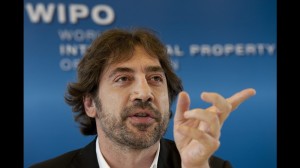
Spanish actor Javier Bardem attends a news conference to discuss the evolution of the film industry in the digital environment and address the challenges of copyright at the World Intellectual Property Organization (WIPO) headquarters in Geneva, Switzerland. Bardem appeared to call for a new international treaty to protect actors' rights across the globe. AP
GENEVA—Spanish film star Javier Bardem on Tuesday urged governments to hammer out a treaty that would protect the livelihoods of performers by safeguarding their works from piracy.
“More than 90 percent of actors have serious problems to pay rent, bills, and even to eat,” he told reporters before speaking to dignitaries negotiating a treaty to protect audiovisual performances.
“Remuneration of actors is crucial. Not for people like me, but for those who have a problem living from what they are doing,” said Bardem, who is married to actress Penelope Cruz with whom he has a son.
Bardem, who won an Academy Award for his portrayal of a remorseless serial killer in “No Country for Old Men”, had been invited along with other cinematic figures to the World Intellectual Property Organization’s copyright negotiations.
WIPO chief Francis Gurry told AFP that “the rights of audiovisual performers had not received adequate protection at the international level… unlike authors or musical performers.”
“If you watch a film, the screenwriter is protected, the musician is protected, the composer is protected. But not the performer,” he said.
Iain Smith, the producer of “Seven Years in Tibet”, said that the treaty could also prove to be a boon for developing countries with a strong film industry, like India or Nigeria.
“Countries like Nigeria have some very interesting filmmakers who work with modest resources,” he told AFP.
“Protecting intellectual property there might not seem very important now, but it will be in the long term.
“If your film does well and you are properly remunerated, then you will have an even better budget the next time around,” Smith said.
Bardem, who said he had “never” downloaded a pirated movie or song, said that although he understood the economic motives behind piracy, it was still a form of theft.
“It is like going to a shop, getting those products for free, and running.
“And the mentality of the people is that to do piracy is fine, because we will harm the actor who has a private jet.
“But they are wrong. They are harming the people behind these people,” he said.
The UN intellectual property agency’s general assembly will decide in September whether to go forward with a draft treaty, which, according to Gurry, could be adopted as early as next year.

